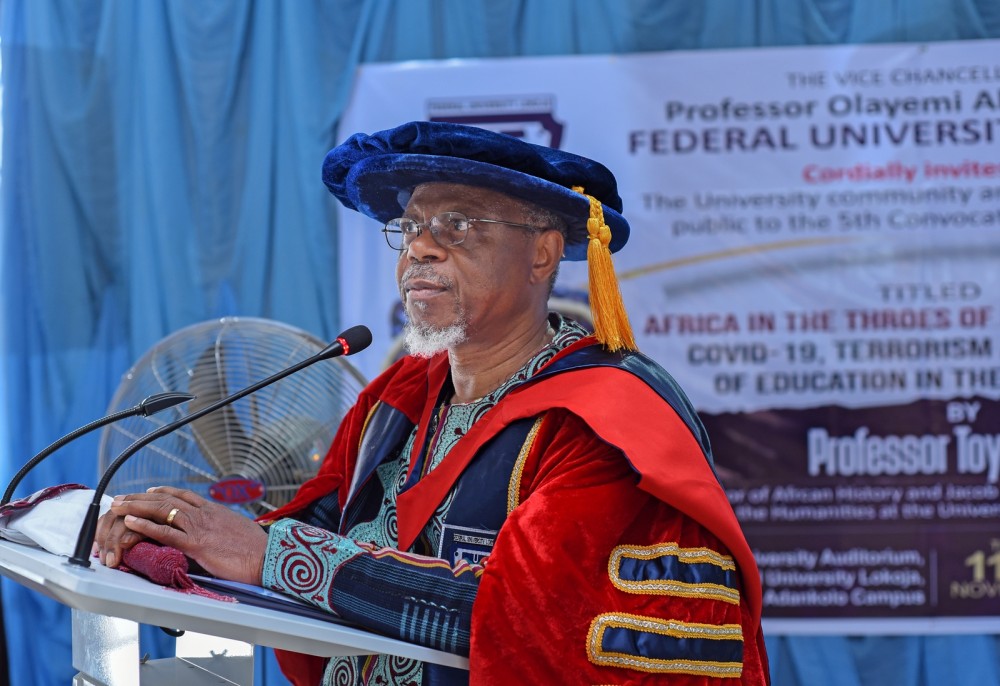Most Recent News
UPDATED: Falola Decries Impact of Terrorism, COVID-19 Pandemic on Education
-
 Chris Yahaya
Chris Yahaya
- November 12, 2021, 11:30 am

Toyin Falola, eminent Professor of History and the Jacob and Frances Sanger Mossiker Chair in the Humanities, the University of Texas at Austin, has decried the impacts of terrorism and the COVID-19 pandemic on Nigeria in particular, and Africa, in general.
This formed the thrust of the fifth convocation lecture of the Federal University Lokoja, Kogi State, delivered by Professor Falola, on Thursday.
The event which was held at the university auditorium, Adankolo Campus, had both the university community and the general public in attendance.
While speaking on the title: ‘Africa in the throes of double pandemic: COVID-19, terrorism and the future of education in the new normal,’ Professor Falola stated that terrorism in Africa and all over the world has a potent side which creates fear in the minds of the average citizens.
He contends that owing to the potentiality of loss of lives and properties, many governments in Africa are forced to put precautions in place and assure their citizens of safety while they work round the clock to end the menace.
According to him, “While this, to some extent, may offer succor to the citizens, it also projects a reality of actual fear in their minds and subtly tells the reality of how movement and activities should be limited. It also tells of how extra caution should be taken, about how security levels should be upgraded, and many more realities of how people’s behavior should be watched.
“The result of these is that many things are affected. For instance, the frequency at which people move to their learning and work is largely affected.While it might be relatively easy to find an alternative to one’s means of livelihood, with the infrastructure deficit in many African countries, finding an alternative to being educated is not as plausible as it makes the effect of terrorism in Africa a lot spectacular than usual.”
He revealed that terrorism has increased the rate of illiteracy in many African countries.
“As a result of the persistent terrorist attacks on educational institutions, the numerous disruptions in the learning flow have discouraged many individuals from pursuing education.
“Consequently, the number of illiterates has begun to increase in those areas severely affected by terrorism, thus, creating room for averagely motivated students to drop out of school and desperately do anything to keep surviving, including being lured into becoming a part of the terrorist cells in Nigeria,” he added.
Not done, the university don equally fingered the COVID-19 pandemic as a major obstruction to the advancement of the learning in many African countries.
“The pandemic has managed to disrupt the frontiers of learning in Africa by restricting how students can get access to education all over the continent. The pandemic has had ripple effects on the state of education on the continent and disrupted the lives of students and teachers in various ways, depending on their levels. The Human Rights Watch research study conducted across various African countries indicates that pre-existing factors aggravated the closure of schools caused by COVID-19.
“It has been reported that the pandemic has resulted in the shutting down of schools in about 215 nations. No doubt, the closure of schools, due to the global pandemic, has brought about a massive disruption to education across Africa, the most affected groups being children who were, earlier mentioned, already deprived of quality education.
“After the outbreak of the virus in March 2020, and the health authorities established that the spread of the pandemic is being expanded by social and physical interactions, it became necessary that interactions, especially among school children who, more often than not, throw caution to the wind, were limited.
“The limitation of these interactions was achieved by the closure of schools across many African countries. Following the closure of schools as a health measure and in light of deficient infrastructure provision for virtual schooling in several African countries, many children across the continent stopped receiving education. As expected, when students are kept out of school, the consequences are often beyond normal.
“For one, the children and the parents who initially are not deeply motivated to receive a formal education are pulled back and rerouted to other endeavors capable of keeping them engaged and fulfilling the necessities for daily survival. Where this continues for long, the need to receive any form of education is dropped in its entirety and the crop of uneducated and enslaved minds grows higher.
“True, higher education in Africa has always been in dire need of urgency and internal and external interventions. But, even more, the pandemic was poised to aggravate the precarious status quo. For an educational system that was barely surviving through the thick and thin of rapid growth in the world’s educational outlook, having a pandemic slow down or halt its pace had an unprecedented effect,” he stated.
He, however, called on all major stakeholders to embrace global information technology access towards positively impacting the lives of the citizens in the era of the new normal, particularly in the education sector.
According to Falola, “The pandemic has proven that it is practically impossible to slow down the changes and transformations currently happening to education in Africa. At best, what can be done is to put in modalities to deal with and fit into many of these changes so that African students will not be left out of receiving uninterrupted and quality education in learning institutions across African countries. Failure to flow with the times and adapt may result in problems of catastrophic proportions on the continent.
“One thing to admit is the fact that the pandemic has completely disrupted the mode of learning. There is now a complete dynamic as to the-where-and-the-how of learning. Since the pandemic broke out, there have been jurisprudential, technical, and social debates about what the classroom means. Our aim is not to interrogate the still unfolding polemics but to deal with the reverberation from this “New Normal”.
“From this point forward, the classroom will look different from what it used to be, with the only classroom idea that students in the future may know being their laptops and other technological gadgets. To cope with this state of affairs, the teaching and learning content, methodology, and systems may need some overhaul to fit the new medium of knowledge transfer.
“However, this new state will take some time before completely unraveling and taking center stage. In essence, we may not have the complete iteration of the “future of education,” as fast-tracked by the pandemic for some years or, worse still, a couple of decades.
“In the meantime, there is a lot of potential for applying technology within the somewhat, albeit, modified traditional system of schooling. Technology can give students access to an endless trove of information beyond what may be physically available within their classrooms or school environments. It can broaden the horizon, reach, and sense of possibility of these students. In an era where inclusivity is becoming a global mantra, there is no better approach to achieving that in education than putting technology in the central stage of learning.”
In his remarks, the Chairman of the Convocation Lecture, His Excellency, Ambassador Godknows Igali thanked the Vice-Chancellor, Professor Olayemi Akinwumi for attracting renowned scholars and notable personalities to Federal University Lokoja.
According to him, the VC has demonstrated his love and passion for the rapid growth of the University by bringing a lot of developmental strides to the University within the shortest time he assumed office. “Being able to invite and listen to Professor Falola is a big privilege for all in the University Community,” he remarked.
He stated that the young University which is located in the Confluence State aggregates the hopes and dreams of the country, stressing that FUL is a great University of tomorrow. Ambassador Igali added that FUL was fortunate to have a dynamic VC like Prof. Akinwumi. “The VC represents the new understanding of what administration is and what administration is to be,” he said.
Sources: Vanguard News Nigeria, FUL News Media | Did you miss the thought-provoking lecture? Watch it here
Latest News
-
CSR: FUL Music Department Students Wow Governor Usman Ododo as Management Presents First Ever Kogi Anthem to State Government
July 17, 2024, 7:30 pm -
Power Generation: FUL Partners US-Based Company to Generate Electricity from Waste
July 17, 2024, 5:28 pm -
Groundbreaking Ceremony of Engr. Dr. Joseph Oyeyani Makoju Memorial Hall at FUL
July 13, 2024, 2:30 pm -
FUL Management Holds Familiarization Meeting with New Governing Council Amidst High Expectations
July 12, 2024, 10:20 pm -
CIPM Kogi State Branch Seeks Collaboration with FUL Registrar, Dr. Rebecca Okojie
July 12, 2024, 1:30 pm -
Groundbreaking Ceremony of Engr. Joseph Oyeyani Makoju Memorial Hall at Federal University Lokoja
July 12, 2024, 8:30 am -
FUL VC Lauds Senator Natasha's People-oriented Programmes as Lawmaker Pledges Support for Kogi Varsity
July 11, 2024, 10:34 pm -
Notice of FUL 20th Inaugural Lecture to be Delivered by Professor David Kolawole Omole
July 11, 2024, 4:12 pm